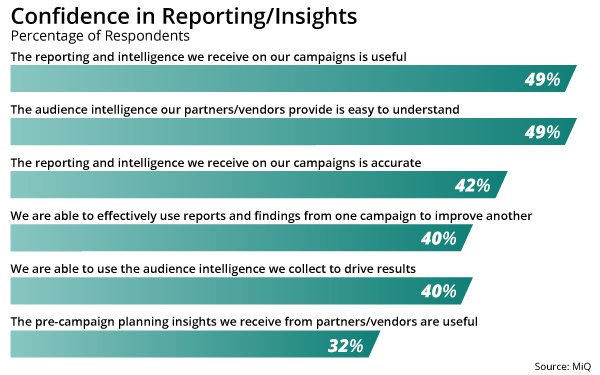
Mixed confidence around using artificial
intelligence (AI) to measure, optimize and analyze campaigns has begun to make marketers feel uneasy as their companies demand better performance based on budgets.
Findings from AI
Confidence Curve, an MiQ survey of more than 3,000 marketers across 16 countries conducted in September 2025, suggest an advertising industry that is learning and exploring different types
of artificial intelligence (AI). The data examines its use and the readiness of marketing, and an eagerness to advance the use of the technology.
In the coming year, 75% of marketers who
participated in a recent MiQ survey feel confident that the results of their campaigns will increase their use of AI, but only half of those say they have the correct goals and learnings to track
performance.
advertisement
advertisement
Media buying and performance optimization are difficult. "We are in the era of juggling media metrics and delivering on business outcomes," said Brian Mandelbaum, chief executive
officer at Attain, a data-driven marketing company that uses live, real-time purchase data for consumer insights.
Attain did not participate in MiQ's study, but Mandelbaum has the same
thoughts on the future of media and AI. Rather than having data trapped in dashboards for weeks, real-time data makes insights possible on an as-needed basis.
AI-driven capabilities through
OutcomeHQ, Attain's data intelligence platform launched last week, provide live purchase signals to anticipate what is working and what is coming next, well before campaigns conclude.
Thirty-eight percent of marketers in MiQ's study said they have not received proper training to work with AI tools, while 38% said their organization does not know how AI or large language models
work well enough, 35% do not have a clear understanding of how their partners’ AI solutions work, and said they 28% do not understand how AI or LLMs work well enough.
For 41% who said
they feel confident, sharing data is the top concern, followed by training. More than one-third of marketers believe they do not have the correct training to use AI-based ad tools because these tools
can be complicated to understand and to use.
Some 49% see a positive outcome to measuring success in cookieless campaigns, while 44% say they understand how targeting and creative drive
performance, 44% believe they track performance against the correct goals and 43% have the correct measurement in place for each part of the funnel,
Another 43% understand how each channel
drives performance, 43% have the correct measurement systems in place to track performance, and 42% said budget allocations at each stage of the funnel are balanced to achieve goals.
Marketers
apply AI most to social media because social media marketers seem to feel the most comfortable with the technology, at 40%, followed by 39% to marketing automation, 38% to customer engagement, and 37%
to visual design, according to the survey.
Some 39% said they apply AI to ad-campaign management, followed by 33% who said they apply it to SEO and content optimization, 32% to content
creation, and 32% to ad creative design and optimization.